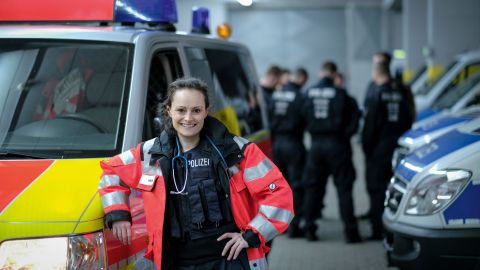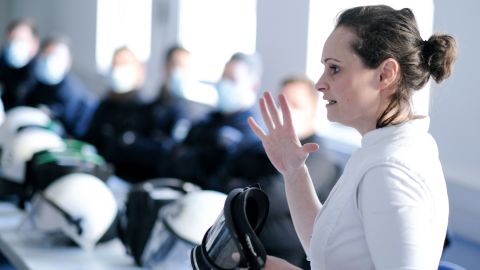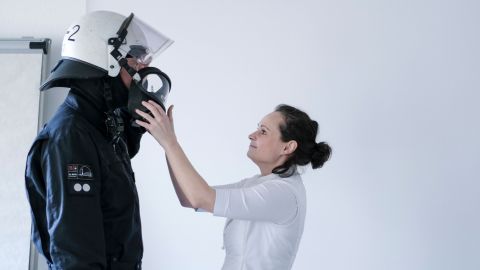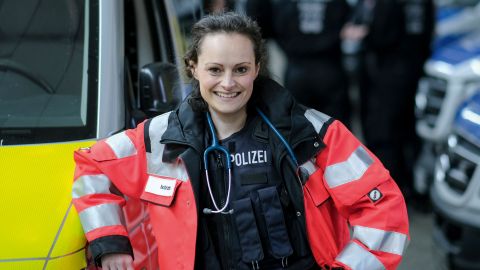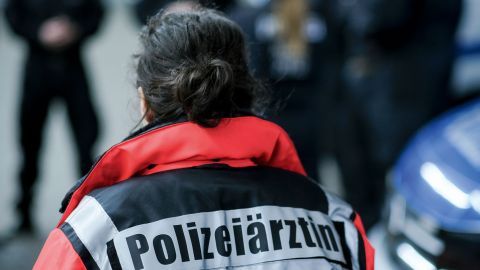Heavy duty boots, police helmet, ampoules of fentanyl and morphine on her belt. Dr. Quentine Pye (37) was prepared for anything on Saturday five years ago at the Garzweiler II open-cast lignite mine: because the situation can escalate quickly during large-scale operations, she had taken the strong anaesthetics out of the safe in the morning. These are the drugs used by a police doctor to treat fractures or deep flesh wounds. In the days before, there had been injuries when climate activists had thrown stones at police officers.
Whether in an open-cast mine or Hambach Forest, at a coronavirus demonstration or a local derby: when the hundreds of police officers are deployed in North Rhine-Westphalia, they are often accompanied by medics in uniform. "Police doctor" is written on the orange fluorescent jacket that the government medical director wears when she goes into action. This is how the police officers recognize their doctor - and by the blue stethoscope dangling around her neck.
Dr. Pye is one of 30 white coats who work as police doctors in North Rhine-Westphalia - except that they almost never wear white coats on duty. Their tasks are too different from everyday hospital work and are sometimes more dangerous.
Back to the day in the Rhineland district, where the hundreds of fully-clothed police stood in the sweltering heat and surrounded the demonstrators. According to the weather forecast, it was the hottest day of the year. The thermometer showed 40 degrees and more. Dr. Quentine Pye and her team were also in the pit with an emergency doctor and ambulance. "The air was shimmering, everyone was sweating profusely," recalls the petite woman. She didn't need any anaesthetics that day, on the contrary. Some demonstrators and police officers collapsed under the sun and the heavy body armor. "No circulatory system can withstand such exertion well," says Dr. Pye.
When she is on the road, she always carries a large red rucksack weighing 20 kilos. It contains emergency medication, infusion sets, intubation and dressing material. In the trunk are oxygen bottles and resuscitation bags as well as a defibrillator for rapid assistance in the event of ventricular fibrillation and cardiac arrest - everything a rescue team needs in an emergency. Fortunately, they had enough cannulas and electrolyte solutions with them in the Rhineland region.
Five years later, it sounds like a story from a bygone era, so much has happened since then: A journalist fell from a tree in Hambach Forest. Polytrauma - seriously injured. Dr. Pye's colleagues provided first aid. A fan collapsed at a soccer match. They were able to resuscitate him. A drunk man with a blood alcohol level of 2.66 was rioting in the drunk tank at Düsseldorf police headquarters. When the colleagues from the police station called, Dr. Pye was on duty. But an emergency comes first. So she closed the surgery to examine the man, who ended up in hospital. Then came corona. Dr. Pye and her team were part of the nationwide vaccination campaign.
But the job of the police doctor is not always that of the rescuer in the greatest need. Wednesday, shortly before 9 a.m.: Dr. Quentine Pye drives her yellow-orange VW van into the yard of the 9th riot police on Tiefenbroicher Weg in Düsseldorf. A blue sticker is stuck to the top left of the windshield: NRW - PP-Düsseldorf-PÄD. PÄD stands for police medical service.
Occupational health advice is on the agenda today. The police team has already gathered in the training room. Dr. Quentine Pye will be giving a lecture on respiratory masks.
Duty accidents, rehab applications, medical fitness checks - all of this lands on the desk of the doctor, who heads a team of six emergency paramedics and medical assistants in Düsseldorf. Dr. Pye examines the patients, looks at the medical records and then documents the results. In total, she is the contact person for around 2,700 police officers and administrative officials. By comparison, a GP looks after just under 1,000 patients on average. That's why every day at the PÄD is tightly scheduled. Dr. Pye will be heading to her next meeting right after her presentation: A meeting with her team. In June, the G7 summit will take place in Elmau, Bavaria. NRW's hundred-strong police force will also be there. Because Elmau is located in a tick area, the PÄD is offering vaccinations against Lyme disease. All of this has to be planned.
But first, a police officer puts on a respirator in the training room on Tiefenbroicher Weg. Dr. Pye explains what can happen when the mask is worn for the first time under stress. She then talks about asthma and allergies. As a company doctor, she is responsible for occupational health and safety, health promotion and prevention. She offers: "If you have breathing problems, I'm here for you." And: "Don't worry. Medical confidentiality applies."
From the clinic to the police - has she ever regretted it? "No, even though the work is very different to everyday life in hospital," says the mother of a young daughter. After studying medicine, she worked for the aid organization German Doctors in the Philippines before writing her doctoral thesis and becoming a specialist in internal medicine. A friend told her about the job with the police. She has been there since 2017. There was only one thing she had to get used to: "The paperwork." Expert reports can be long.
The PÄD's practice is located in a backyard behind a heavy fire door. It looks like a GP's: reception, doctor's room, laboratory and examination rooms. But they don't treat stomach flu here. Her daily routine includes occupational health screening as well as vaccination and travel consultations. She also examines police officers who are going on deployment abroad. "Sometimes, for example, a worried family man finds his way to me after injuring himself on a junkie needle during an operation," says Dr. Pye.
Many police officers who come to her have had an accident on duty. "Fortunately, they are often trivial," says the doctor. But sometimes the psyche can no longer cope. Then she has to assess: Would it be better to do indoor duty instead of patrol duty? Shift work is also a recurring issue. After 30 years, patrol officers often suffer from sleep disorders. What should they do? That's a case-by-case decision every time.
The company doctor who helps and the medical officer who assesses - all in one person. Dr. Quentine Pye says: "That doesn't fit together and often leads to conflicts. After all, why should a patient talk to the company doctor today about their worries at work if they have to worry that she might write them off as unfit for work tomorrow?"
In order to remedy these shortcomings, a state working group has been working on a strategic reorientation of occupational health and safety since 2021. One goal: in future, every police doctor will only be a company doctor for "their" patients in the field. At the same time, they will write reports for other police stations as a medical officer.
This eliminates administrative tasks and gives him more time for his patients. State-of-the-art technology will also support this.
